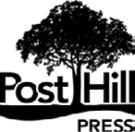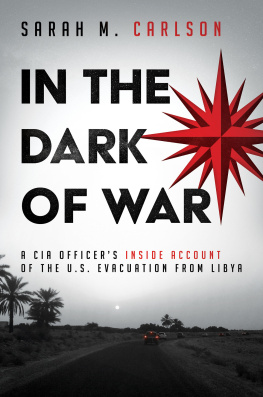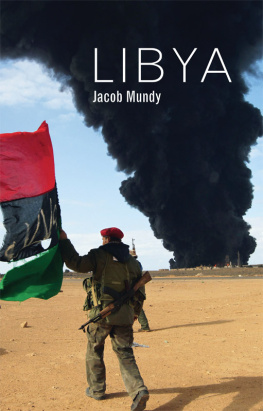A FIDELIS BOOKS BOOK
An Imprint of Post Hill Press
ISBN: 978-1-64293-471-7
ISBN (eBook): 978-1-64293-472-4
In the Dark of War:
A CIA Officers Inside Account of the U.S. Evacuation from Libya
2020 by Sarah M. Carlson
All Rights Reserved
Cover Design by Cody Corcoran
This is a work of nonfiction. All people, locations, events, and situations are portrayed to the best of the authors memory.
This does not constitute an official release of CIA information. All statements of fact, opinion, or analysis expressed are those of the author and do not reflect the official positions or views of the Central Intelligence Agency (CIA) or any other U.S. Government agency. Nothing in the contents should be construed as asserting or implying U.S. Government authentication of information or CIA endorsement of the authors views. This material has been reviewed solely for classifications.
No part of this book may be reproduced, stored in a retrieval system, or transmitted by any means without the written permission of the author and publisher.


Post Hill Press
New York Nashville
posthillpress.com
Published in the United States of America
To those who continue to serve in dangerous places overseas, you are not alone.
Table of Contents
On July 26, 2014, the US Mission evacuated Tripoli, Libya, as civil war broke out in the country. While surrounded by militia forces, the entire US Mission conducted the emergency destruction of our facilities and evacuated more than 150 US personnel overland, in armored vehicles, through hostile territory, amidst active fighting, and in a heightened terrorist threat environment.
The civil war started in Tripoli on July 13, 2014. Thirteen days later, we initiated the evacuation at approximately 0500 in Tripoli and arrived in Tunis, Tunisia, the following morning at 0700, twenty-six hours later.
The following story is based on real events and my first-hand observations while I served as a CIA officer as part of the US Mission in Tripoli, Libya. I worked closely with the officers described herein. It is told from my perspective and that of my colleagues and friends who led the evacuation. This accounting covers the span of a year, with the primary concentration on the evacuation.
My main objective with regard to individual officers described herein was to protect their true identities. The officers are based on real people, but no true names are used and all call signs have been changed. In addition, most of the officers are a blend of more than one individual to incorporate personnel changes, turnover, conceal the number of officers, and account for personal breaks occurring throughout the year. I slightly altered the timing of arrivals and departures of incoming and outgoing personnel as a result.
The US Ambassador, as the Presidents designated representative and the most senior State Department official in a country, represents former President Barack Obamas Administration in this narrative and is not solely reflective of a single individual.
The dialogue is not verbatim. I instead attempted to capture the general atmosphere, my memory of conversations, and anecdotes conveyed to me. All the events described herein occurred and are detailed to the best of my ability. I attempted to honestly and accurately capture the events and actions of all the US government personnel in Libya.
I served as a counterterrorism analyst with the US Government for more than a decade, including in the Central Intelligence Agency (CIA). As a former CIA officer, I am required to submit all written or oral material intended for public consumption to the CIAs Publication Review Board (PRB) with the objective of excising any classified information or sensitive operational details. This is a requirement placed on all former employees in order to protect the secrecy of CIA sources and methods. I complied with that requirement.
I chose not to use redacted text in this account. I wanted no distracting, blacked out phrases or missing pages of information. I instead worked with the PRB to choose alternate language I felt conveyed the same meaning and intent, while also protecting our national security, which was my highest priority.
The bravest are surely those who have the clearest vision of what is before them, glory and danger alike, and yet notwithstanding, go out to meet it.
Thucydides The Peloponnesian War, 2.40
Evacuation:
The Announcement
(July 24, 2014)
Net call, net call, net call. There will be an all-hands in five minutes in the office, came the radio call from Harbor, our acting chief. All officers located on the compound the afternoon of July 24, 2014, paused to listen to his announcement, including me.
I scowled in concern at my radio before turning to Nomad, a security officer and former Navy SEAL, who sat beside me inside the relative safety of our villa. Nomad and I met the previous October and we helped and relied on each other. He protected the other officers and me, while I warned him about the things in Libya from which we needed protection. We would need much protection in the coming days.
Is this it? Nomad asked me. Decision time on whether we remain in Libya or evacuate?
I think so. The SVTC with Washington D.C. just concluded, I said. Government leaders in Washington held the SVTC, or secure video teleconference, to determine whether or not the entire US Mission would evacuate Tripoli, Libya, including myself, Nomad, and the other officers under Harbors command.
I knew the chances were high the entire US Mission would evacuate soon and, if it happened, I knew my colleagues and I would help lead it. I heard from the ambassador, she planned to recommend a full-scale evacuation to the president and his administration.
Until a few days prior, the ambassador claimed she was staunchly against leaving and repeatedly emphasized to all personnel the US administration would not lose Libya. It could not fail.
Now theyd waited too long, despite the warnings. Now we had few options for escape.
I glanced back at my radio listening for responses. None came. I then prepared to walk to the office. I donned my body armor, holstered my Glock 19 pistol, slipped my knife into my boot, and grabbed my radio.
What do you think they decided? Nomad asked me as he re-holstered his Glock and picked up his rifle.
Wed been listening to music, trying to drown out the sounds of heavy artillery exploding around us. It hadnt stopped for weeks and each concussion sent a jolt of fear through my heart.
An intense firefight also raged nearby throughout the morning and we both needed a short break. I definitely needed the break while the SVTC occurred. I knew it would decide our collective fate.
Up until a few days ago, Id have guessed we were staying. Now Im fairly certain were about to drive to Tunis, I replied.
Driving through active fighting in a war could be even more dangerous than staying at this point. At least here we have bunkers, food, water, and weapons.
I agree. Its extremely risky.
What about the southern airfield? We finished the reconnaissance about an hour ago and it seems like a good option, said Nomad.














